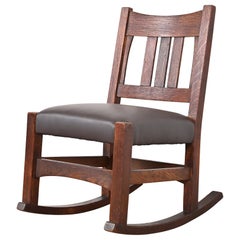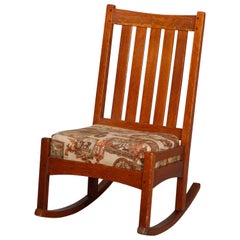Antique Sewing Rocker
Early 20th Century American Arts and Crafts Rocking Chairs
Leather, Oak
Recent Sales
Early 20th Century American Arts and Crafts Rocking Chairs
Upholstery, Oak
People Also Browsed
Early 20th Century European Arts and Crafts Coat Racks and Stands
Metal, Brass
Antique Early 1900s American Arts and Crafts Dining Room Tables
Oak
Early 20th Century American Arts and Crafts Desks and Writing Tables
Oak, Cork
Early 20th Century North American Arts and Crafts Wardrobes and Armoires
Oak
Vintage 1960s Arts and Crafts Coat Racks and Stands
Oak
Antique Early 1900s British Arts and Crafts Settees
Beech
Vintage 1910s American Arts and Crafts Bookcases
Brass
Early 20th Century American Arts and Crafts Settees
Upholstery, Oak
Early 2000s American Mission Wall Mirrors
Metal
Early 20th Century American Arts and Crafts Desks
Copper
Antique Early 1900s English Arts and Crafts Lanterns
Copper
Antique Early 1900s American Arts and Crafts Armchairs
Leather, Oak
Early 20th Century American Arts and Crafts Desks and Writing Tables
Copper
Early 20th Century American Arts and Crafts Desks and Writing Tables
Copper
Early 20th Century American Arts and Crafts Desks and Writing Tables
Copper
Antique Early 1900s English Arts and Crafts Windows
Stained Glass
Finding the Right Rocking-chairs for You
The phrase “rocking chair” didn’t find its way into the dictionary until the mid-18th century. While most of the sitting furniture that we use in our homes originated in either England or France, the iconic rocking chair is a quintessentially American piece of furniture.
A Philadelphia cabinetmaker’s bill for a proto-rocking chair issued in 1742, which identified the seat as a “Nurse Chair with rockers,” is the earliest surviving evidence of this design’s humble beginnings. The nurse chair was a low side chair intended for nursing women, so giving it a soothing rocking motion made sense. Rocking chairs, which saw a curved slat affixed to the chairs’ feet so that they could be literally rocked, quickly gained popularity across the United States, garnering a reputation as a seat that everyone could love. They offered casual comfort without the expensive fabrics and upholstery that put armchairs out of many families’ budgets.
Rocking chairs are unique in that they don’t just offer a place to rest — they offer an opportunity to reminisce. The presence of one of these classic pieces stirs up our penchant for nostalgia and has the power to transform a space. They easily introduce a simple country feel to the city or bring the peaceful rhythm of a porch swing into a sheltered sunroom. Although craftsmen took to painting and stenciling varieties of the chairs that emerged in New England during the 19th century, the most traditional rocking chairs are generally unadorned seats constructed with time-tested materials like wood and metal. As such, a minimalist vintage rocking chair can be ushered into any corner of your home without significantly disrupting your existing decor scheme or the room’s color palette.
In the decades since the first rocker, top designers have made the piece their own. Viennese chair maker Michael Thonet produced a series of rockers in the middle of the 19th century in which the different curved steam-bent wood parts were integrated into fluid, sinuous wholes. Mid-century modernists Charles and Ray Eames added wooden rockers to their famous plastic shell armchair, while Danish designer Frank Reenskaug opted for teak and polished beech, introducing pops of color with small cushions (a precursor to the bold works that would follow in the 1970s and 1980s).
No matter your personal style, let 1stDibs pair you with your perfect seat. Deck out your porch, patio or parlor — browse the vintage, new and antique rocking chairs in our vast collection today.

